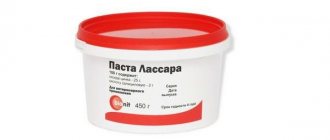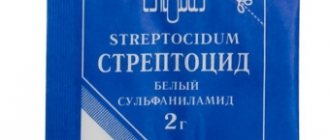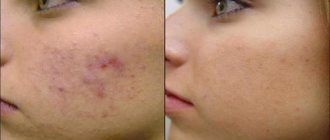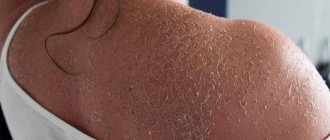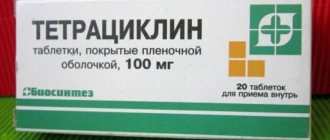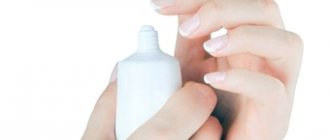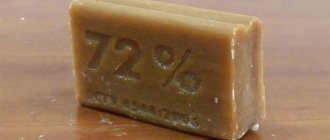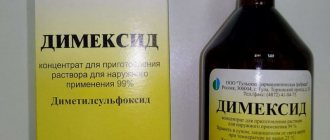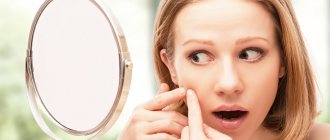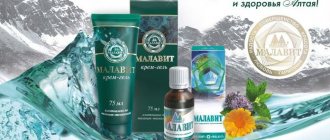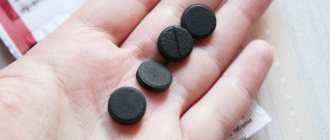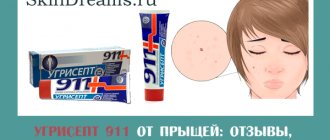Every day, human skin is exposed to aggressive environmental factors and serves as a protective barrier. As a result of this, many people face problems with acne breakouts, and it is not necessary that the disease will only bother them during adolescence. Today, the medical industry offers a large number of “fashionable” drugs that actually turn out to be ineffective. Zinc paste for acne is a time-tested remedy, the cost of which is several times less than newfangled drugs.
Description
The main properties that Zinc ointment has for acne on the face are:
- Bactericidal;
- Drying;
- Anti-inflammatory.
The medication is produced in the form of an ointment with a thick consistency. There is no noticeable odor. The drug arrives on the shelves in tubes of 15 or 30 g.
The main active ingredient is zinc oxide. In the classic version, the composition contains 10 percent of the main component mixed with Vaseline.
Some manufacturers also add:
- Menthol. Has an antiseptic and slight anesthetic effect;
- Fish fat. Provides accelerated penetration into cells;
- Lanolin. Strengthens wound healing processes;
- Polymethylsiloxane polyhydrate. Protects the dermis from infections;
- Parabens. They differ in antiseptic properties.
It has a positive effect on facial skin due to the following factors:
- Acceleration of tissue healing processes;
- Prevention of irritation and redness;
- Minimizing the release of fluid from inflamed cells;
- Softening the skin.
How long to keep on your face
You should not leave the zinc mask on your face too long, as it has a drying effect. In addition, it can cause addiction and blockage of sweat and sebaceous pores, which negatively affects the functioning of the skin. The ointment should be applied to the skin several times a day. If after 15-20 minutes. the ointment is not absorbed, all residues must be removed with a napkin.
Zinc ointment is a real remedy against acne and wrinkles
Zinc ointment: indications for use
The main indications for use are complex and systematic therapy of the following skin pathologies and disorders:
- Abrasions, scratches;
- Acne, acne, blackheads;
- Hemorrhoids in the initial stage;
- Weeping eczema;
- Allergic dermatitis;
- Diaper dermatitis;
- Dermatological infections caused by viruses;
- Bites resulting in scratching;
- Herpes;
- Aggravated neurodermatitis;
- Trophic ulcer;
- Infection in burns;
- Bedsores;
- Negative effects of direct rays of the sun;
- Prickly heat.
Additionally used to smooth out fine wrinkles and marks caused by rashes.
How does zinc stop acne?
For a long time, the reasons why zinc was so effective in treating acne were unknown.
People knew that vitamin A reduces sebum production, but they had no idea about the benefits of zinc for the skin. Many people believed that it was necessary for the formation of cells in the skin, hair and nails.
New evidence suggests that zinc's benefits go much deeper, with effects on the immune system including:
Controls inflammation.
If there is chronic inflammation in the body, with pro-inflammatory cytokines produced en masse, then consuming more zinc can quickly alleviate the problem.
Zinc is closely related to the immune system and controls some of its functions. This means that the inflammatory response to acne bacteria won't be as huge and the red pimples won't swell massively.
Zinc controls acne inflammation by reducing levels of NF-kB, which is the messenger that precedes the release of many pro-inflammatory cytokines in our body.
Zinc actively reduces the inflammatory response to bacteria. When bacteria invade blocked pores, they can cause severe irritation in the area, causing pimples to become red and very painful.
Acne-prone skin reacts much more strongly to bacteria than normal, healthy skin. Zinc helps moderate the inflammatory response and reduce the impact of bacteria on the skin.
Transport of vitamin A.
Vitamin A - directly reduces the activity of the sebaceous glands, and zinc is vital for the effective transport and use of this vitamin.
Zinc is a key component of the retinol-binding protein, which transfers vitamin A from the bloodstream to receptors on the skin, where it further performs its functions.
Fast healing of wounds.
This is another effect of zinc on the whole body and on the skin directly. It helps acne heal faster, thereby reducing the overall number of acne.
Antioxidant action.
Antioxidants benefit the skin by preventing sebum from oxidizing (another cause of acne).
In addition to the presence of antioxidants in fruits and vegetables, our body is capable of producing some of its own: superoxide dismutase and glutathione. It is known that patients with acne have a deficiency of these enzymes.
Zinc is a key component of glutathione. By increasing its levels in the body, we enhance overall antioxidant activity.
Kills bacteria.
Test tube tests show that zinc kills acne-causing bacteria. Of course, not as effective as antibiotics, but it still works. Bacteria cannot cause resistance to zinc, so it is also effective for people with antibiotic-resistant bacteria on their skin.
Reduces activation of keratinocytes.
Keratinocytes are cells that produce keratin, which in large quantities interferes with cell separation and leads to the formation of blocked pores, which also causes acne. By reducing keratin production, zinc helps skin pores remain open.
Blocks DHT (dihydrotestosterone).
Zinc is also useful for acne in the case of blocking dihydrotestosterone, which means it reduces the effect of hormones on the skin. Other DHT blockers are known to reduce the amount of sebum that produces clogged skin pores. Unfortunately, zinc does not block DHT too much, but this is a huge plus for it.
Contraindications and side effects
Absolute contraindications for use:
- Hypersensitivity to the constituent components;
- Purulent inflammatory processes.
Use with caution during pregnancy and lactation.
Excessively prolonged use or uncontrolled application provokes a number of side effects:
- Peeling;
- Feeling of dryness;
- Increased burning and itching;
- Formation of redness;
- Allergic reactions;
- The appearance of additional rash.
In case of accidental ingestion, it is necessary to urgently induce vomiting, undergo gastric lavage and take activated charcoal.
Treatment with Zinc ointment cannot be combined with zinc oxide preparations.
How to prepare and apply the mask
Any cosmetic product should be applied only to dry, cleansed skin. After removing makeup, experts recommend wiping the skin with a swab soaked in Sangviritrin or Chlorhexidine. These are bacterial preparations with a mild antiseptic effect. They are ideal for inflamed skin.
Anyone can prepare a mask using zinc ointment. Most popular recipes:
- With cream. To prepare a mask for the night, zinc ointment is mixed with any usual cream. All ingredients are mixed in a 1:1 ratio.
- With licorice root. A spoonful of licorice powder is mixed with the same amount of zinc ointment. All components are thoroughly mixed until a homogeneous mass is obtained. Keep the mask on for 15-20 minutes, after which it is washed off and moisturized with nourishing cream.
- With clay. To prepare a mask, you can use green, white, black, blue or pink clay. In a glass container, the clay is diluted with water to a paste-like state, after which a teaspoon of ointment is added to it. After mixing, the product is ready for use. The mask is applied to the face and décolleté for 15-20 minutes.
Zinc ointment against acne: application
Doctors recommend using the drug in its pure form, as well as preparing home remedies that include Zinc ointment. Instructions for use for acne include the preparation stage and the immediate treatment of the skin.
The preparatory stage involves:
- Washing and disinfecting hands with alcohol or Chlorhexidine;
- Carrying out an allergy test by applying it to the wrist. A quarter of an hour is enough to assess the tolerability of the components;
- Cleansing the face with products that do not contain oils or alcohol.
Rules of use:
- Apply the paste in a thin layer. If there are single rashes, they should be treated pointwise; large affected areas should be lubricated entirely;
- Precautionary measures. The ointment should not come into contact with mucous membranes;
- Elimination of composition. It is not completely absorbed, so after half an hour you need to blot your face with a napkin and rinse off the residue with warm water.
Additional recommendations:
- The ointment should be applied carefully and should not be rubbed in with force;
- Frequency of use – from 2 to 6 times a day;
- Treatment requires the exclusion of other local acne remedies and decorative cosmetics;
- For deep subcutaneous rashes, compresses can be applied: apply ointment to a cotton pad, attach to the problem area with a band-aid overnight, and remove in the morning.
There are the following home recipes based on zinc oxide ointment:
- Mix 20 g of the main component, 25 g of salicylic ointment and the same amount of sulfuric ointment. Add birch tar in the amount of 7 drops. Drop 2 drops of esters of juniper, tea tree, rosemary, bergamot. Pour in 5 drops of retinol. Stir until creamy and store in the dark and cold. At night, acne should be spot-treated;
- Combine 30 g of ground licorice root and a teaspoon of zinc paste. Apply as a mask, remove after 20 minutes.
The following medicines based on Zinc ointment must be kept for half an hour. Recipes:
- Stir a tablespoon of honey and paste until smooth;
- Dilute green clay to a paste. Use water or hydrosol. Add 5 drops each of jojoba and almond oils, 2 teaspoons of ointment;
- Mix the main component and wheat germ oil in equal proportions. Add beaten chicken white;
- Dilute the blue clay with kefir and yogurt to form a thick mass. Mix 2 drops of argan oil and 5 g of zinc paste;
- Grind 15 g of rolled oats. Mix 15 g of ointment and 3 drops of peach oil with them.
Pure zinc paste
The composition of zinc paste does not include anything unnecessary or questionable: it is only zinc oxide, and Vaseline - so that the paste acquires the desired consistency. The paste is applied externally. Contraindications include hypersensitivity to the main component or individual intolerance.
How it works
In medicine, zinc has always been used as an antiseptic. In the paste it is present in the form of zinc oxide, which primarily exhibits a powerful bactericidal effect. Once on the affected area, it disinfects, relieves inflammation and has a wound-healing effect. Zinc dries out the pustule, tightens enlarged pores, which prevents them from filling with sebum and the formation of comedones.
How to use
Zinc paste for acne is used as follows. It is applied either pointwise directly to the affected area, or in a thin layer on clean skin of the face (or, for example, the back).
If you have encountered such an incident as a lonely pimple in an inappropriately visible place, then this remedy can help you. It must be applied with a cotton swab or other convenient object directly to the pimple, and by the morning the problem will become noticeably smaller or disappear altogether.
Due to Vaseline, the product may seem very greasy; it practically cannot be washed off with water or even soap. There are several effective ways to cleanse your skin of paste:
- If you leave the product on overnight, then in the morning before washing your face, it is advisable to wipe your face with a dry cloth to remove excess product;
- The product is washed off well with tar soap or lotion;
- The product can be removed with warm olive or vegetable oil: heat the oil in the microwave or in a steam bath, moisten a cotton swab with it, and rub it over the skin. In addition to the therapeutic effect of the ointment, there will also be a cosmetic effect.
If the paste is used as a preventive measure on the entire face (or other part of the body), then it is better to do it at night. For daytime use, it is not recommended to apply makeup after application. And because of the greasy consistency of the ointment, this will be problematic. The drug can be used almost every day for 2 weeks. People with dry skin should be careful, as zinc paste has a strong drying effect.
Price
Price: on average up to 50 rubles.
How to use Zinc ointment for post-acne?
Zinc ointment is also effective in combating the consequences of rashes. For acne spots, it is used in the same way as for rashes. The composition must be applied pointwise to the marks in a thin layer, however, when fighting pigmentation, there is no need to wash off the paste; just blot off the excess with a cloth or paper napkin.
The duration of treatment is until complete disappearance. Frequency of application – from 4 to 6 treatments per day.
For oily dermis, it is also useful to use a post-acne mask, to which Zinc ointment is added. Mode of application:
- Slipping with pink clay;
- The consistency should be thick;
- Distribute over face;
- After 15 minutes, rinse off;
- Lubricate the dermis with moisturizing milk or cream.
Analogs
To combat wrinkles, the use of other pharmaceutical drugs is practiced. These are Retinoic ointment, Aevit, Radevit (instructions), Hyaluronic acid, cosmetic oils of jojoba, almond, peach.
Efficiency: when will it help?
Dermatologists confirm that Zinc ointment for acne is effective due to a complex of properties beneficial for problem skin. Treatment takes varying amounts of time. The speed of recovery depends on the regularity of use, the severity of the disease and the accuracy of compliance with the following recommendations:
- Adding foods high in zinc to the diet - legumes, liver, nuts, chicken and quail eggs and avoiding foods containing copper and soy protein;
- Refusal of additional pharmaceutical creams and gels, especially those based on erythromycin.
Reviews
Maria, 23 years old I was often bothered by small pimples on my back. A friend advised me to purchase a zinc-based product, the price of which is only 25 rubles. I apply it pointwise. As soon as a pimple pops up, I immediately apply it with a cotton swab. After just five days of use I noticed an improvement. The pustules have dried up, new ones do not appear.
Katya, 30 years old I used to think that acne was only a problem for teenagers. After pregnancy, my face became covered with unpleasant pimples. The dermatologist prescribed me to take vitamins and use acne ointment with zinc. After two weeks of use, all the pimples disappeared, there weren’t even any scars left. My face is still clean. I recommend this inexpensive product to everyone.
Elena, 18 years old Acne has plagued me since childhood. I tried different advertised products. Nothing helped. Mom suggested trying to lubricate each pimple with zinc ointment. I’ve been using the product for a week, the pustules have noticeably dried out and new ones haven’t appeared yet. The skin itself is not dry, it even becomes more elastic. Good drug.
Zinc ointment has found wide application both in medicine and in cosmetology. Zinc has a positive effect on a person's appearance. Zinc ointment for the face can prevent the appearance of unwanted wrinkles, as well as help cope with various skin pathologies.
Regular use of zinc anti-wrinkle ointment helps to quickly cure acne and get rid of blemishes on the face.
Cream for combination and normal skin types
For people with normal skin type, it is recommended to mix zinc ointment with spermaceti.
To prepare the cream, you need to take 8 grams of spermaceti and melt it in a water bath. When the spermaceti has finally become liquid, add the entire tube of zinc ointment to the resulting solution. The resulting cream helps slow down aging.
If you can’t buy pharmacy spermaceti, you can use spermaceti cream and add a little olive oil at the end.
How does it affect?
Over time, due to a lack of nutrients, the skin becomes less elastic and wrinkled. Zinc ointment, getting on the top layer of the skin, improves the functioning of metabolic processes and maintains the skin in normal condition. The ointment opens the pores, cleanses them, and the skin “breathes.”
Positive aspects of the ointment:
- Dries out the skin and purulent pimples, thereby eliminating irritation and inflammation.
- Disinfects, which helps protect against various infections. This helps relieve itching and prevent acne.
- Promotes collagen production, which makes the skin soft and elastic.
- Thanks to the ointment, the skin quickly cleanses, heals and leaves no traces of wounds, scratches, or pimples.
Zinc ointment is considered so safe that it is used to care for infant skin.
NOTE!
To quickly get rid of blackheads, acne and pimples, as well as to rejuvenate your facial skin, we recommend that you familiarize yourself with this effective remedy .
Find out more...
Compound
Zinc ointment consists of the following components:
- Active substance - zinc oxide, 10%. The action is aimed at reducing the level of oily skin, which causes inflammation and rashes.
- Excipient: white soft paraffin. It does not cause an allergic reaction at all, its action is aimed at:
- restoration - paraffin nourishes and moisturizes the skin, eliminating flaking;
- rejuvenation - moisturized skin becomes elastic, small and large wrinkles are smoothed out, the facial contour becomes clearer;
- cleansing - by tightening the skin, paraffin helps narrow pores.
Zinc ointment
For acne on the back
An improved version of zinc ointment - zinc-salicylic ointment or Lassara paste - will help get rid of comedones on the back. It is also affordable - a bottle will cost 25-35 rubles, but is even more effective due to the action of salicyl - reducing fat content and local acceleration of blood flow.
Lassara paste based on zinc
The product is used as follows: on the cleansed skin of the back, the product is applied at night on pimples and acne. In the morning, wash off the paste with warm water. If the paste has dried and cannot be washed off, scraping may be necessary to remove it. To avoid mechanical damage, it is better not to apply it to inflamed acne.
It must be said that Lassara paste has a number of contraindications, the main of which are pregnancy, anemia, kidney failure, and problems with blood clotting.
